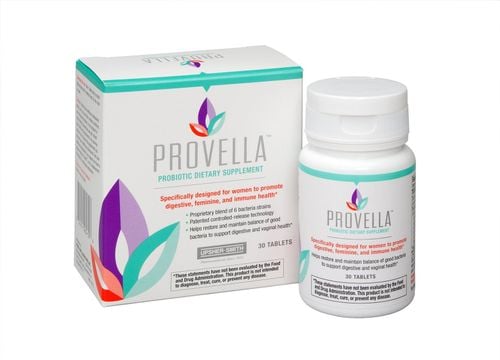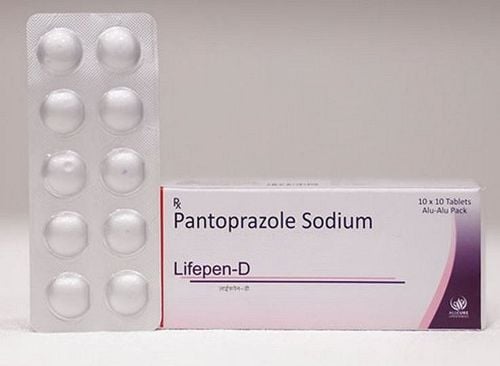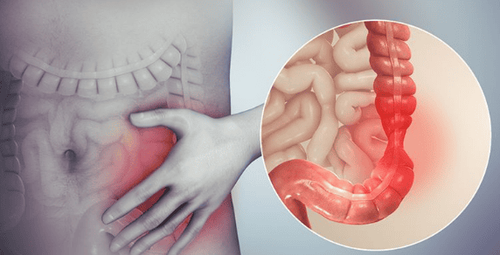This is an automatically translated article.
The article was professionally consulted by Doctor Gastroenterologist, Department of Medical Examination & Internal Medicine - Vinmec Hai Phong International Hospital
Irritable Bowel Syndrome (IBS) is a problem in 30% of adults. In particular, pregnant women are more susceptible to the disease. If you maintain a healthy, scientific lifestyle, irritable bowel syndrome during pregnancy can be controlled and kept healthy.
1. What is irritable bowel syndrome during pregnancy?
Irritable Bowel Syndrome is a functional bowel disorder, IBS is defined as recurrent abdominal pain, on average, at least one day per week for the past three months, associated with two or more of the following criteria:
Relevance to defecation Related to change in frequency of defecation Related to change in stool morphology Irritable bowel syndrome usually occurs after intestinal infections, food allergies or sensitivities, homeostasis Although the disease is not life-threatening, it affects the patient's quality of life, the treatment is expensive, while the results are quite limited.
Irritable bowel syndrome is common in pregnant women. This is because IBS is common in women of childbearing age, on the other hand, during pregnancy gastrointestinal symptoms seem to be aggravated by the effects of female sex hormones on gastrointestinal motility.

2. Symptoms of Irritable Bowel Syndrome in Pregnancy
What are the symptoms of irritable bowel syndrome?
Abdominal cramps. Abnormal bowel movements: Diarrhea or constipation. Stomach bloating. Symptoms are usually worse after eating, relieved after defecating
3. Methods to treat irritable bowel syndrome during pregnancy

During pregnancy, the treatment for irritable bowel syndrome is mainly to relieve symptoms of the disease by making lifestyle changes. Specifically:
Psychological treatment: Irritable bowel syndrome is a neurological disease, so psychological factors are very important in the treatment of the disease. The doctor needs to explain to the patient that the disease is not dangerous to health so that the patient can cooperate and avoid anxiety and insecurity, making treatment more effective. In addition, depression also adversely affects irritable bowel syndrome in pregnant women. Therefore, pregnant women need to relax to calm the condition and help the fetus develop normally. Dietary changes: adding fiber (fruits, vegetables and whole grains) to your daily diet can improve symptoms of constipation and diarrhea. However, the diet of pregnant women should not have too much fiber because it can cause bloating. In addition, pregnant women should avoid using caffeine or stimulants, gas-producing foods such as beans, broccoli, cabbage, ... because it will increase uncomfortable symptoms of the disease. Drink plenty of water: pregnant women should drink 8-10 small cups of water a day to provide water to soften stools and limit constipation. In addition, prune juice also works to relieve constipation for pregnant women. Therefore, if possible, pregnant women should drink a little warm plum water every morning. Besides, pregnant women can drink warm ginger water to warm the abdomen and fight nausea. Lifestyle adjustment: when having irritable bowel syndrome, pregnant women should practice gentle exercises, practice deep breathing, walk 30 minutes a day, limit sitting a lot. Talk to your doctor about medications: Medications help people with irritable bowel syndrome manage diarrhea, constipation, and other symptoms. However, some ingredients may not be safe for pregnant women. Therefore, pregnant women and their families should consult their doctor about stopping using the drug until childbirth or switching to a new drug to ensure safety for mother and baby. Some herbs can be used to improve irritable bowel symptoms with the advice of a doctor. When suffering from irritable bowel syndrome during pregnancy, the patient should keep a relaxed, optimistic mood, eat scientifically, exercise moderately and strictly follow the instructions of the doctor to control the symptoms of the disease.
Currently, Vinmec International General Hospital is a prestigious address trusted by many patients in performing diagnostic techniques for digestive diseases, diseases that cause chronic diarrhea or Crohn's disease... In particular, the screening techniques for gastric cancer and gastric polyps at Vinmec were performed using the Olympus CV 190 endoscope, the NBI function (Narrow Banding Imaging - endoscopy with narrow light frequency band) for image results. analyze mucosal pathology more clearly... Thanks to that, the doctor can make an accurate diagnosis and give a timely treatment plan. Not only has a modern equipment system, Vinmec is also a place to gather a team of experienced doctors and nurses, especially, with a space designed according to 5-star hotel standards, Vinmec is guaranteed to bring bring the patient comfort, friendliness, peace of mind.
Please dial HOTLINE for more information or register for an appointment HERE. Download MyVinmec app to make appointments faster and to manage your bookings easily.













